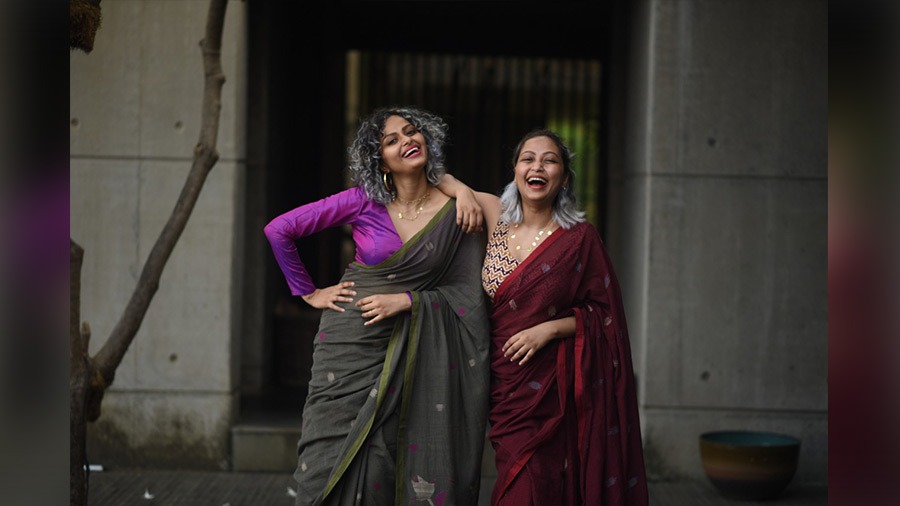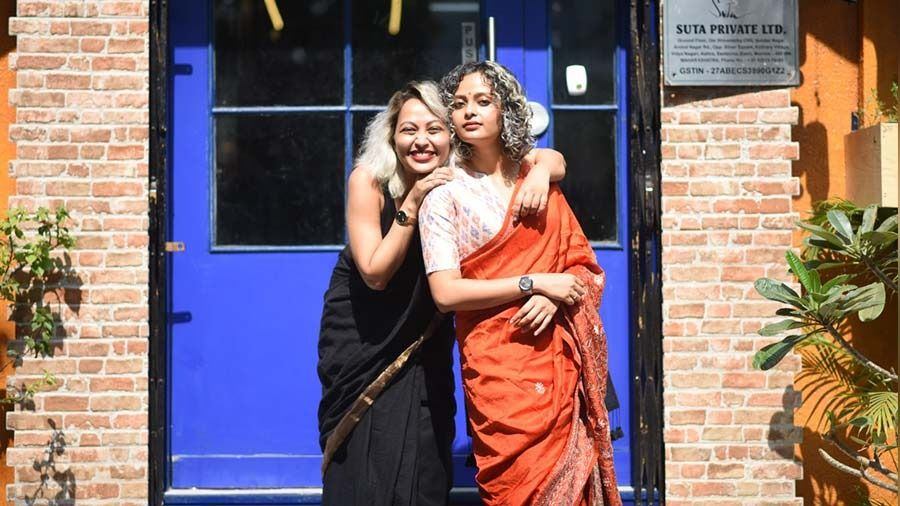Suta, a Mumbai-based brand that celebrates raw threads, traditional boldness and uninterrupted simplicity, has made a name for itself within a short span of six years. Conceived as a one-stop destination for sari lovers, and ‘not-sari-lovers’, who ultimately fall in love with the six yards. My Kolkata spoke to sisters Sujata Biswas and Taniya Biswas of Suta, who complement each other’s skill sets while having the same vision. They talk about how Suta began, pleading with weavers, their Kolkata connection and more.Edited excerpts from the conversation follow…
My Kolkata: How did you coin the name Suta?
Sujata and Taniya: Suta is an amalgamation of the first two letters of our names Sujata (Su) and Taniya (Ta). It also means ‘thread’.
How did Suta start?
Honestly, we did not plan for it. Before beginning Suta, we used to do a lot of different photography projects. In 2016, we officially registered Suta. It’s been six years since then. We met a lot of weavers and realised we can have a lot of impact. We thought of working directly with the weavers and creating a new model because the sector is very unorganised. After crossing a lot of hurdles and fighting many battles, Suta was born.
What made you choose saris?
We wanted to dispel the myth that sari is occasional-wear, or cumbersome to wear and manage. We focussed on saris to curb this notion. In our childhood, we saw our didas and thakumas (grandmothers), and even ma, who would do every household chore draped in a sari. It’s not only in our family, it is more or less the same scene in every Indian family. Then, suddenly, saris came to be considered as occasional wear. Saris suddenly became kind of untouchable, especially for youngsters. Even if they wore it on some occasion, it was their mother’s or aunt’s sari. They hardly bought a sari themself. So, we thought that if we bought these Mul sarees and styled them differently, it would definitely create a buzz. Wearing a sari is a head-turner in itself. We started getting compliments. Then we thought of making this accessible. We planned to make a one-stop shop for saris, blouses and petticoats. Suta is about traditional weaves in contemporary style.
How did you connect with the weavers?
Our background had got nothing to do with saris or designing. We both had corporate jobs before this. Our father worked for the railways. We asked him to find out people from his staff who lived in villages and were connected to the weaving community. We got a lead from there and started off..
How difficult was it to convince the weavers to make the type of products you wanted?
We wanted to take the fabrics from the looms directly. We went to the village and spoke to the weavers. Initially, everyone was sceptical. No one wanted to take a chance, since this is not what was demanded by the mass. They were worried about their future. After a lot of persuasion, they finally agreed. Initially, we were very tense about how to make the supply chain effective, but gradually things began to fall in place. The supply has to be constant, especially for e-commerce. If a black sari is displayed, it has to remain black and cannot turn grey. So maintaining consistency and quality was our prime motto. We remember buying starched saris from the weavers, washing them four to five times with our hand and making them starch-free. After a lot of pleading, they actually started to make it our way. They first agreed to do away with the excess starch, then gradually got rid of the starch from the threads too. A lot of training and hardwork is woven into each sari.
What was your first product?
It was a mulmul off-white sari. It is still there on our website and is one of the bestsellers. It's a plain sari with just tassels. It is a very simple design, but much appreciated. A lot of styling can be done with it.
What is the one thing that sets Suta apart?
We make things which you can wear without being anyone else. We value comfort over everything else and hence our customer base is also like that. We have always paid importance to how you feel and not what others tell you about how you should look. That’s what we believe and that's what we communicate, be it through our stories, reels or fabrics. As a brand, we believe in self-love.
Tell us something about your childhood and your connection to Kolkata…
Though we are Bengalis, we have been to Kolkata only during summer vacations and other holidays. Since our dad was in the railways, we have travelled to different parts of the country, especially eastern India, like Odisha, Bihar, Jharkhand and Visakhapatnam. After retirement, our dad moved to Kolkata, and now we have a lot of connections there. When we visit Kolkata we are like completely ‘ghorer meye’. We love to eat typical Bengali household dishes. We just crave for them.

'We have always paid importance to how you feel and not what others tell you about how you should look,' say the sisters
Since you have been to many parts of the country and each part has its own handloom heritage, why did you choose weavers from West Bengal?
The first reason is language. We think the weavers feel more connected if you can speak their language. They are more comfortable. The second reason is that we knew the weaves. We have seen our relatives draping the saris and hence we knew the style.
